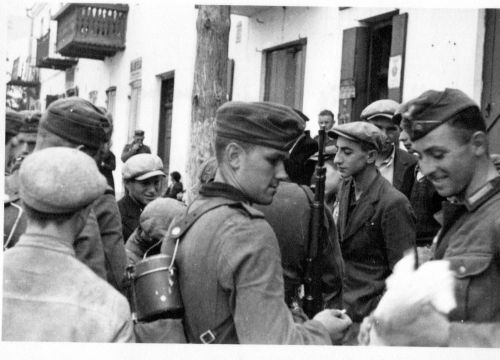Henje Kozszuchowicz
Surviving The Occupation Years 1939-1944

Ostrow Mazowiecka - German Soldiers in Market Square (Chris Webb Private Archive)
After Hitler's gangsters arrived in Ostrow Mazowiecka in 1939, their first activity was to hunt for Jews and drag them out of the houses - women with children in their hands. The Germans ordered all the Jews to the square at the brewery. After several hours, they were all driven outside of the town, on the Warszawa Highway, to the forest while threatening them with machine guns. The Germans ordered the Jews to dig a grave and then they shot all the Jews. Poles were ordered by the Germans to throw the bodies into the grave. A lot of Jews were still alive when they were tossed into the grave. The earth heaved. Among the unlucky ones was my father Moisze Berl Kozszuchowicz, who managed to run away when they took the Jews from the brewery.
Since then no Jews have been seen in Ostrow Mazowiecka. Jewish survivors later crossed to the other side of the Bug River. Among them was my entire family. We were not allowed to take anything with us other than a kilo of food products. Now we began to suffer greatly. Our family included nine people. My old grandfather Hersz Kozszuchowicz, died at the age of eighty-four in 1942, in Brzoza. My father Moisze Berl and my mother Chana nee Kohen, my younger brother Chaim age ten, were taken away by the Nazis in sealed trucks, smeared with coal dust, to Treblinka where they were burned alive. My brother, Mordchai was shot while in bed, by the Gestapo. He was living in Brzoza. Three bullets made holes in his head.
My sister Rachel starved to death in the Warsaw ghetto during the liquidation. I was left alone with my ten-year old sister Rejzel. Our situation was dire. This was winter 1942. We did not have any money or a roof over our heads. Our house was the forest, our bed -leaves and moss, dug out from under the snow. A luxurious bed was one in a stable with straw, located in a village and it was ours as long as we could get in secretly without alerting the owner. The Poles were afraid to take Jews in, because if the Germans found out the entire family would be shot and their property burned.
Now we poor orphans were in hell. The German's frequent searches for Jews and partisans in the forest had driven me to despair and resignation, but I continued my struggle against death, because I had become a mother to my little sister. During the most frightening time, I remembered a Polish friend in Warsaw. With God's help, my sister and I went to him. The Pole, Mieczyslaw Cyalka, gave no thought to the neighbour who could turn him in for helping Jews and took care of us, as if we were his dear sisters. Actually, he was also persecuted for sabotage, by the Nazis. He managed to get us false papers.Once we were Polish we felt safer, but we still lived in fear because accidents happen. The Pole took better care of us than himself. He would say that he was prepared to die because he was alone without any family, but we must live, because we were two souls and moreover, Jewish; he comforted us by telling us the war would end soon.
For safety reasons we gave my sister Rejzel - who could pass as Polish - to a Pole as a maid. Later the Pole Cyalka and I began smuggling so that we would not starve to death. Returning from a trip, I was grabbed in Siedlce to be sent to work in Germany. With the help of Cyalka, I was able to escape. This was in 1943. We returned to Warsaw where my dear friend managed to obtain another set of false papers for me under a new name. After that I was only stopped once by the Gestapo, because they thought i was Jewish, but thanks to the false papers I was delivered from their hands. Spring 1944, it is impossible to find a place to hide. My friend Cyalka and I ran off to the Holy Cross Mountains in the area of Kielce. There we were able to live in peace for a while.
In May 1944, I was captured by a group of partisans who were hostile to Jews and since they thought I was Jewish, sentenced me to death. My dear guardian once again came to my rescue. He swore on his life that I was Polish and that he knew my entire family before the war. I was set free.
Despite all the pain and torment we managed to live until the end of the war. My sister had been sent to Germany during the uprising and she remained there until she was freed. She returned in 1946. We have Cyalka to thank for our lives. He put his life on the line for us for two years. He is a real mentsch - human being.
Sources
Yizkor Book of the Ostrow Mazowiecka Jewish Community, New York, USA, 2013
Photograph Chris Webb Private Archive
© Holocaust Historical Society, October 8, 2019

